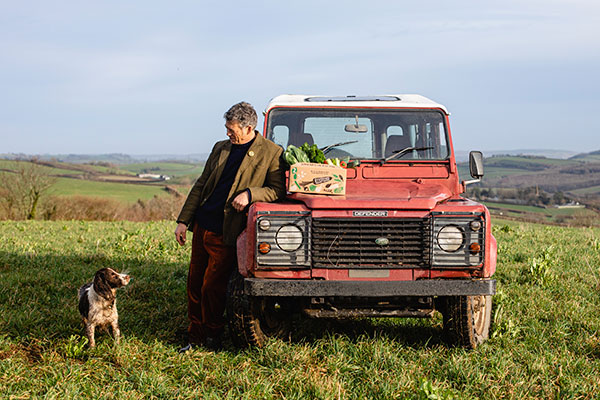All the leeks are planted, as well as more than half our winter cauliflowers, cabbages, kales and purple sprouting broccoli. A blisteringly dry April, May and early June raised nerves, as our reservoirs dropped alarmingly, but the rest of June’s rain replenished moisture in the soil. There were enough dry days for us to keep on top of the work, and enough rain to get newly planted crops established without the need for irrigation. July looks set to continue the changeable pattern.
As I enter my declining years, I am slightly disappointed to still feel the need to validate my existence by leaving a mark; building an edifice, a physical embodiment of my purpose to compensate for my spiritual impoverishment. On bad days I feel like my dog, cocking his leg to leave his scent for others to admire. I know this pitiful, restless, typically male drive is the fundamental cause of so many of our environmental problems; doing almost always means consuming.
As I seem incapable of restraining myself completely, I have embraced the self-imposed challenge of making my mark with as little impact and as much benefit as possible. In the case of my two summer projects, building half an acre of polytunnels and a 100 tonne-squash store, this means using over 90 per cent secondhand materials.
As a result, these projects have become skill, creativity and labour intensive, rather than capital and resource intensive. Both projects will reduce the need for imports by extending the season of UK crops and reducing losses in store. As we pass the halfway point, it is looking like they will be delivered for less than half the cost of using new materials, with a similar longevity.
So why do we waste so much? To argue that our throwaway culture is driven by economics is an over-simplification. It often has more to do with ease of (lazy) management, concepts of professionalism (it’s got to be shiny to make us feel good about ourselves), exploiting a deskilled workforce (reuse always requires more skill and imagination to make things fit), and the unintended consequences of well-meaning legislation (health and safety, building regulations, etc.).
The masters of reuse are almost always those who grew up with least: the old, and those from poorer economies. Their skills deserve more appreciation, but are liable to die with them unless we all learn to consume less and value more.













If you’re not too busy Guy could you consider becoming our Prime Minister ?
Hear hear!
Guy can count on my vote
I’d vote for you.
I’ll second thay
What a brilliant idea!!!
You’ve made an interesting observation regarding ‘spiritual poverty’. Addressing this might improve the way you feel. Your observations about this world are so caring and so true! You and people like you are working so hard to protect it. We need a power greater than ourselves to put things right.
Nice ponderings, Guy. I took a watch with a broken winder, and a cuckoo clock missing a hand to Carshalton clock shop and asked the elderly watchmaker if he was training his replacement; he said it was too much detail work for the youth, so his skills will die and batteries replace him.
Lack of apprentices is a result of government policies.
It is such a joy to know that there are business people out there like yourselves, who take the time and effort to reuse the valuable resources that this earth provides us with!
Why don’t you run for Prime Minister?? It would be a pleasure to vote for you!
Guy,
there is a simple mantra for leading a good life – you need to live, to love, to learn and to leave a legacy. I think it applies to women just as much as men. The legacy is a necessary life goal in our godless society to ensure we think about society and not just ourselves.
You don’t say what the worst of your legacy building dreams were, but to test the worthiness of your legacy, ask yourself whether you would still believe it necessary even if it went completely unnoticed after your death. Or if you suspect a legacy-inspired goal is just pure ego, ask yourself whether you’d still be inspired to do it if it went unnoticed.